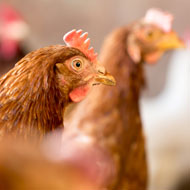Novel technique may cut cost of bronchitis vaccine production

Infectious bronchitis remains a major problem in the global poultry industry. Because
New research led by The Pirbright Institute could result in low-cost infectious bronchitis vaccine (IBV) production.
In a study published in the Journal of Virology, researchers describe how they genetically modified an IBV strain so that it could be grown in cell cultures in the laboratory, rather than inside hen eggs.
It is hoped the technique could lower the cost of vaccine production and make the process more efficient.
“To find the genetic code that made the lab strain able to replicate in cell cultures, we scanned the gene that produces the spike protein—the protein which enables the virus to attach to and enter cells—and found a genetic sequence which was unique to that virus,” explained Dr Bickerton, leader of the Coronaviruses group at Pirbright.
“We were able to cut this sequence out of the lab strain and replace it in the vaccine strain to see if this allowed the vaccine strain to replicate in cell cultures too.”
Interestingly, the team discovered the sequence which allows lab growth of IBV strains results in the change of only three amino acids in the spike protein.
Dr Bickerton adds: “We can now apply this modification to other IBV vaccine strains, which will help improve the speed and efficiency of IBV studies and can eventually be applied to vaccine production”.
Despite there being an array of vaccines in existence, infectious bronchitis remains a major problem in the global poultry industry. Because the majority of IBV strains do not grow in cell cultures, IBV vaccines are grown in hen's eggs - a process that is cumbersome and expensive.
Researchers estimate that a 10 per reduction in IBV incidence could save the global poultry industry £654 million. Boosting the efficiency and speed of IBV vaccine production is, therefore, crucial to reducing economic losses and welfare problems in chickens.



 The latest
The latest